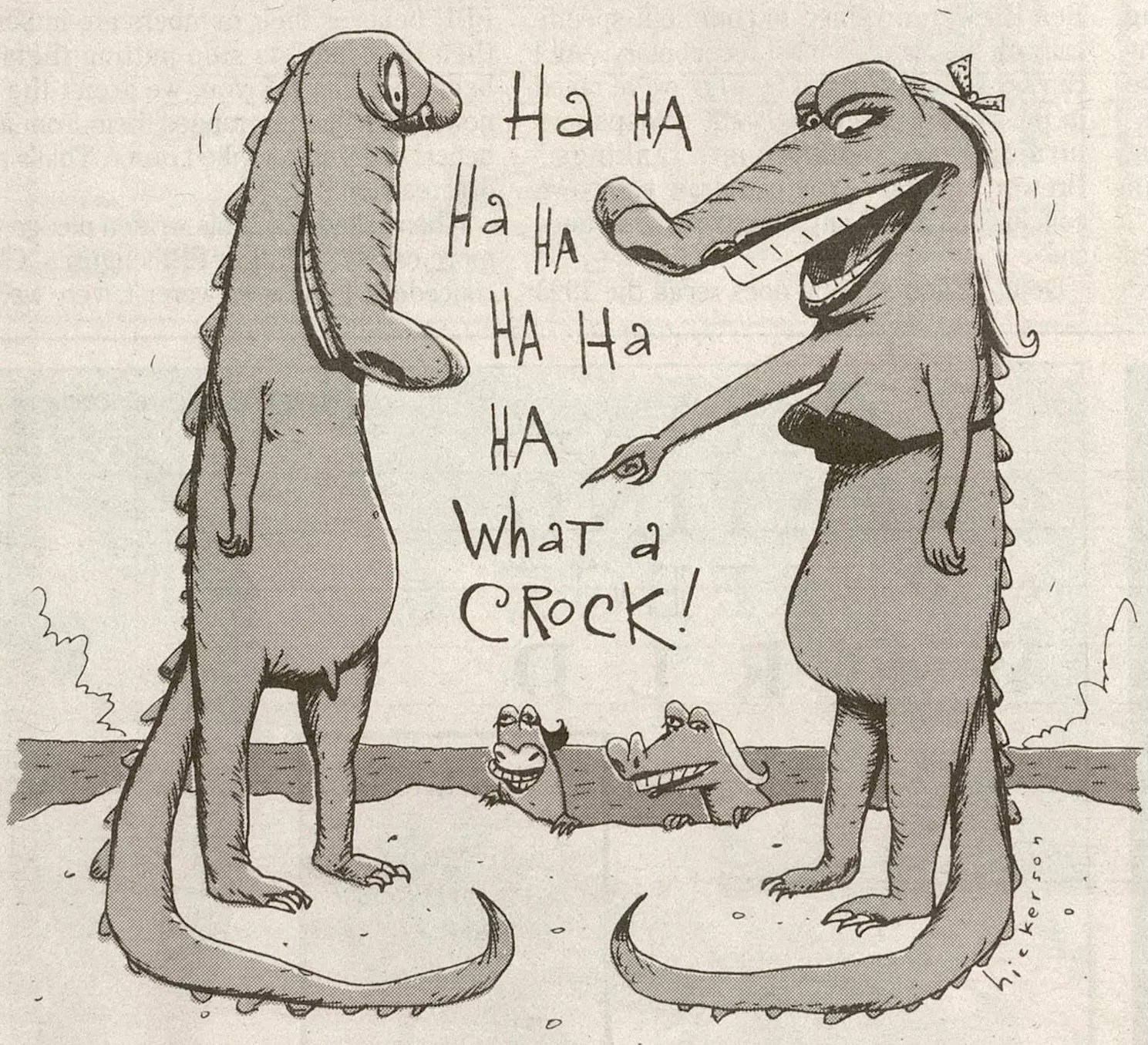
Miami New Times image: Illustration by Buddy Hickerson

Audio By Carbonatix
The Washington Post characterizes it as an “emerging global problem.” Newsweek dubs it “a plot twist worthy of science fiction.” Congress convenes hearings so research scientists can testify about its relevance to the survival of the human species. The topic that has caused such consternation?
Alligators’ ding-dongs are getting smaller.
Louis Guillette made this startling discovery more than a year ago, while gathering gator eggs in Orange County’s Lake Apopka, where he was researching the species’ potential as a renewable resource. “It had been noted that the animals’ embryos weren’t developing normally,” explains the University of Florida endocrinologist. “One thing we found that was abnormal was low levels of testosterone in the males – a level similar to that [normally] found in females.”
When he compared the members of his gators with those of reptiles from a “control lake,” Guillette found the Apopka population averaged a paltry 25 percent of their control-group counterparts, peniswise. (The phallus of a full-grown alligator measures roughly six inches.) Moreover, testosterone levels in the Apopka gators were so low that many were sterile.
Guillette believes the shortcomings are due to residual concentrations of pesticides and other chemicals. Historically, the 30,000-acre lake has been a dumping ground for DDT and other toxic materials, its water quality worsened by agricultural discharges (runoff) and ineffective drainage. With specific regard to the puny penises, Guillette has found evidence suggesting that contaminants including DDT and DDE (a chemical formed when DDT breaks down) are the primary culprits. When Guillette replicated the conditions in Lake Apopka by painting alligator eggs with similar doses of DDE in the laboratory, only ten percent of the eggs hatched and a disproportionate number of the hatchlings were female. The theory is that along with shrinking males’ apparatuses, the contaminants cause embryos to develop more often into females, and that those females tend to have overdeveloped sex organs.
After the general issue of contaminants affecting fertility became known, President Clinton and Congress moved to create legislation and called hearings, where Guillette and others warned that reproductive malfunctions similar to the alligators’ might well be in store for other creatures – including humans – owing to the polluted state of our planet. “You are not half the man your grandfather was,” he told the legislative panel. Indeed, a long-term Danish study has revealed that sperm counts in men around the world have decreased 50 percent over the past five decades.
Guillette admits to getting a little sensitive about the media’s handling of the matter. “A paper in San Francisco said something about this being the reason female gators get snappy,” he recalls. “I testified before Congress and said that every man in the room was half the man his grandfather was, and everybody quotes that line. But the question is, ‘Will our grandsons be half the men we are? Will we face widespread infertility?'”
The subject of widespread infertility also raises the question of whether South Florida’s alligators are as genitally challenged as their Apopka brethren. National Park Service ranger James Laray is up to his ankles in alligators at the Shark Valley ranger station. “No comment,” he replies, when asked whether he’s observed any shrunken penises. After he stops laughing, he adds, “I’ve heard about it in the northern part of the state. But there’s no indication it’s affecting our gators.”
Miccosukee tribal employee Anthony Willie lives on his tribe’s reservation in the Everglades. Willie spent six months in training as an alligator wrestler and even has a “pet” gator that lives in a pond near his home. “No, I haven’t noticed anything like that,” he reports. “My gator is a female. Is this for ‘News of the Weird?'”
Todd Hardwick, whose Pesky Critters Wildlife Control service receives more than 150 complaints each year of alligators being found in urban environments in South Florida and who is the official alligator agent for Dade County, concedes, “I’ve never investigated that. Now, if this guy from the University of Florida wants some penises, we can provide them, and he can measure them himself. It’s an internal organ,” Hardwick points out. “We sex gators by sticking a finger up the vent. If it goes all the way in, it’s a female; if it hits something, male. If [Guillette’s] theory is true, I have to wonder about how that could affect the quality of the meat. I don’t sell it, but I do eat it, and now I find myself looking down at my penis. Also, since I heard this, I’ve given up swimming in fresh water.”
Guillette seems less worried about alligator meat than about the future of the human race. “The research now shows that human sperm counts are going down a million sperm per year over the past twenty years,” says the scientist. “One of the arguments [made in research papers] is that this corresponds to the Industrial Revolution, the whole better-living-through-chemistry thing. In the past twenty years, we’ve cleaned that up. Our argument is that it’s not the toxic effects, it’s the subtle effects. Of course, having a small penis is not subtle if you’re a human, or even if you’re a male alligator. But it’s not fatal.”
At least not in the short run.